Bee Pollen
This fact sheet provides essential information about bee pollen, including its common names, uses, potential side effects, and resources for further information.
Common Names
- Bee Pollen
Uses
Bee pollen is believed to:
- Rejuvenate the body
- Stimulate organs and glands
- Enhance vitality
- Contribute to a longer lifespan
How It Is Used
Bee pollen is collected from flowers by bees and mixed with bee digestive enzymes.
Scientific Insights
- There is a common belief that consuming local honey containing pollen can help individuals with asthma or hay fever experience fewer symptoms during pollen season. Some people report that taking one teaspoon to one tablespoon of local honey or bee pollen daily helps them manage their allergies. However, there is no medical research to support these claims.
Side Effects and Cautions
- Bee pollen should be avoided by anyone allergic to honey or bees, and medical attention should be sought immediately if an allergic reaction occurs.
- Diabetics should also avoid bee pollen due to potential effects on blood sugar levels.
Resources
This summary highlights the key aspects of bee pollen, including its traditional uses, potential benefits, and safety considerations.


